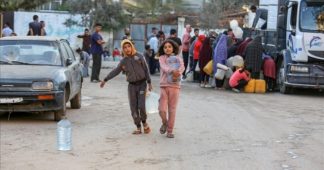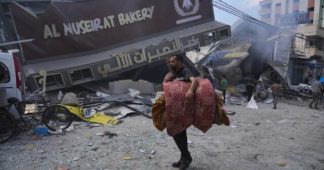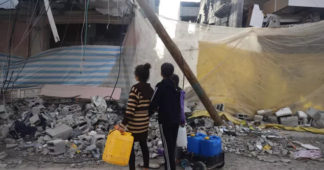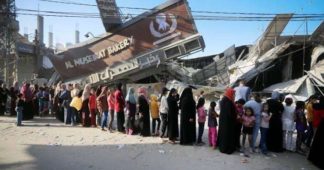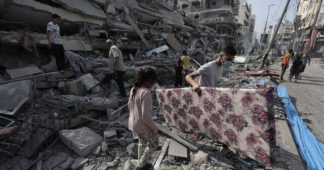By Mera Aladam
Aug 15, 2025
An outbreak of skin diseases is also spreading due to the sweltering weather and harsh displacement conditions
As temperatures in the Gaza Strip surpass 40 degrees celsius, health authorities and rights organisations have sounded the alarm over increasing dehydration cases and the spread of diseases.
The United Nation’s agency for Palestinian refugees (Unrwa) warned in a post on X that the scorching heat is “making an already desperate situation far worse”.
The agency noted the limited water supply across the besieged enclave, as Israel continues its months-long blockade on the territory.
“Bombardments and forced displacement continue. With limited electricity and fuel, there is no relief from the extreme heat,” it said. “There must be a ceasefire.”
Gaza is facing severe water shortages due to months of Israeli attacks targeting water and sanitation infrastructure, including desalination plants and sewage systems.
The blockaded enclave – which was already suffering from a water crisis before the nearly 700-day genocide – now has less than four percent of the fresh water in needs, with surrounding sea water polluted by sewage.
The Gaza government press office has previously said that such Israeli attacks are aimed at “turning water into a tool of genocide and a weapon of slow killing”.
Moreover, expulsion orders issued in recent weeks have left displaced Palestinians vulnerable to dehydration.
The spokesperson for the United Nations Secretary General Antonio Guterres warned in late July that these displacement orders target sources of clean water, as they have concerned zones hosting vital water infrastructure.
Among them is the desalination plant in southern Gaza, a main source of drinking water for internally displaced people in al-Mawasi. The plant serves hundreds of thousands of people, producing about 2,500 cubic meters of water per day.
“As of early July, 80 percent of water sanitation and hygiene facilities fall within the Israeli militarised zone or in areas that have been placed under displacement orders,” Stephane Dujarric told reporters.
Lack of shelters and spread of diseases
Compounding the dehydration is the absence of proper shelter for the majority of Gaza’s displaced population.
An Israeli ban on the entry of shelter materials, including tents, has been in effect for at least five months, according to the UN.
Moreover, persistent bombardment has targeted much of Gaza’s buildings, with a total of 192,812 damaged or destroyed structures identified in recent satellite imagery, comprising nearly 80 percent of total structures in the blockaded strip.
The United Nations Office for the Coordination of Humanitarian Affairs (Ocha) warned that if Israel’s recently announced operation to fully occupy Gaza advances, “thousands of families already enduring appalling humanitarian conditions could be pushed over the edge”.
“Nearly everyone in Gaza has been displaced at least once since the war began, and the makeshift shelters they managed to improvise or acquire have often either worn out or been abandoned in the rush to flee,” Ocha’s update added.
The Red Crescent in Gaza stressed that “more than 90 percent of the Strip’s population lives in tents and suffers from the intense heat,” which “has caused the emergence of diseases in the displacement camps”, in light of Israel’s deliberate “recycling of displacement in the Strip, forcing residents to move in harsh conditions.”
The Director of Al-Shifa Medical Complex in Gaza, Mohammed Abu Salmiya, noted an outbreak of skin diseases spreading due to the sweltering weather, warning that the intense heat and lack of drinking water are impacting the health of civilians of all ages.
Salmiya added that the health sector is going through its “worst phase” amid Israel’s ongoing starvation and genocide of Gaza residents, which has killed over 61,776 and injured 154,906 other Palestinians since 7 October 2023.
We remind our readers that publication of articles on our site does not mean that we agree with what is written. Our policy is to publish anything which we consider of interest, so as to assist our readers in forming their opinions. Sometimes we even publish articles with which we totally disagree, since we believe it is important for our readers to be informed on as wide a spectrum of views as possible.
